Effective staff scheduling is crucial for ensuring operational efficiency and customer satisfaction. However, navigating the complexities of hotel scheduling and managing hospitality staff can pose significant challenges, from handling varying shifts to addressing unexpected absences. This article aims to provide practical insights and strategies for hospitality staff scheduling, including the use of free employee shift scheduling apps to help you overcome these hurdles and optimize your hospitality scheduling processes for success.
Challenges of Hospitality Staff Scheduling
Scheduling staff in the hospitality industry comes with a range of challenges. Here are some of the most common issues managers face:
- Fluctuating demand – Seasonal changes, holidays, and events can cause staffing needs to spike or drop quickly, making it hard to plan accurately.
- Employee availability – Staff often have varied schedules or other commitments. Balancing preferences and coverage—especially with last-minute changes or shift swaps—can be tricky.
- Matching skills to shifts – Assigning the right person with the right skills to the right shift is essential but difficult, especially in larger teams.
- Labor law compliance – Scheduling must follow rules around wages (including minimum wage), breaks, and overtime, which adds legal complexity to the process.
- Communication – Keeping everyone informed, resolving conflicts, and coordinating across departments is especially challenging in bigger operations.
Tackling these challenges with the right scheduling strategies and tools can improve efficiency and lead to better guest experiences.
Rules of Effective Hospitality Staff Scheduling
Understand demand patterns
Analyzing demand patterns is key for hospitality staff scheduling. Use historical data and seasonal trends to predict busy and slow periods. This proactive strategy helps ensure enough staff during peak times and avoids overstaffing when it’s quiet.
❗ Tip: Use a hotel housekeeping shift schedule with predictive analytics. These tools forecast demand using smart algorithms, helping you adjust staffing levels in advance, cut labor costs, and meet guest expectations.
Prioritize employee preferences
Prioritizing employee preferences helps create a positive work environment and boost satisfaction. Letting staff share their availability and shift preferences makes scheduling more collaborative and fair.
A good approach is to let employees submit their preferred shifts and time-off requests directly in the system. This gives them more control and helps managers build better schedules.
❗ Pro tip: Offer incentives for employees who stay flexible. Perks like preferred shifts or extra time off can reward team members who help fill scheduling gaps, leading to better morale and smoother operations.
Utilize technology
Scheduling platforms automate tasks like shift creation, availability tracking, and time-off management, saving managers time and reducing errors.
These platforms also offer real-time visibility into staffing levels and gaps, helping managers adjust schedules to ensure adequate coverage during peak times and optimize labor costs during slower periods.
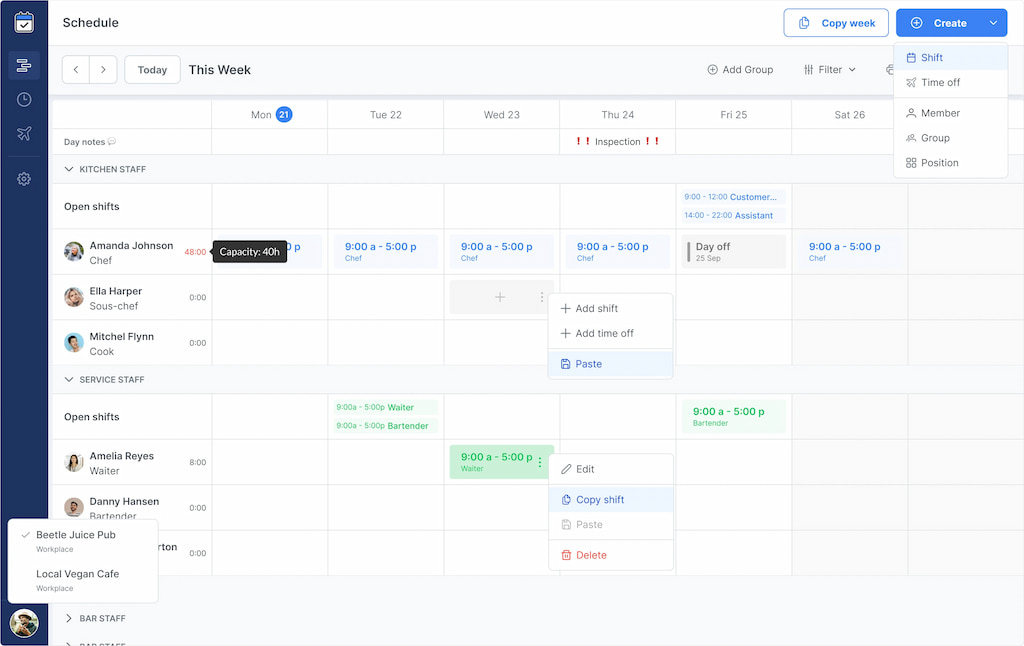
❗ Pro tip: Choose hotel scheduling software that integrates with other hospitality systems like POS and payroll. This integration simplifies data sharing, reduces manual entry, and boosts overall efficiency.
Cross-train employees
Cross-training employees allows staff to gain skills across multiple roles, increasing scheduling flexibility and helping to avoid staffing shortages or absences.
A structured cross-training program includes opportunities to learn different tasks through shadowing, training sessions, and hands-on practice. Regular assessments help track progress and identify improvement areas.
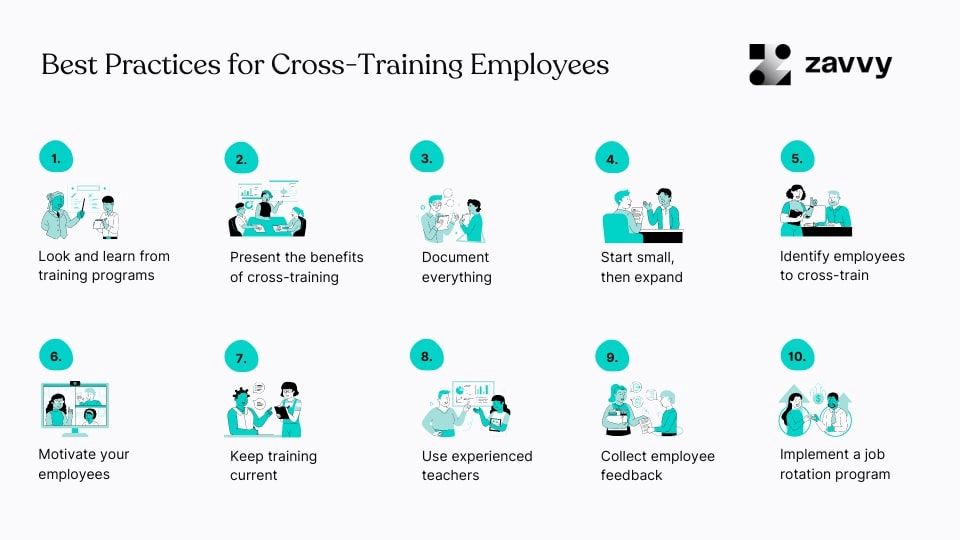
❗ Pro tip: Add skill development and career advancement opportunities to the program, such as certifications or mentorship. This supports professional growth and strengthens your workforce, improving service and adaptability.
Communicate effectively
Effective communication is essential in hospitality staff scheduling, ensuring team members are informed, engaged, and aligned with business goals. Clear communication helps managers share schedules and updates, minimizing confusion among staff.
Using communication tools like mobile apps and messaging platforms ensures remote employees are informed, regardless of location. This helps streamline communication and improves efficiency.
![what is shift planning? [benefits & best solution in 2023]](https://blog-cdn.everhour.com/blog/wp-content/uploads/2022/12/communication-1.gif)
❗ Tip: Set up regular team meetings (weekly or bi-weekly) to maintain consistent communication. Include topics on scheduling, performance, and employee recognition to foster transparency, accountability, and teamwork.
Implement fair scheduling practices
To ensure fair distribution of shifts and opportunities, it’s important to avoid favoritism and offer all staff equal access to desirable shifts, overtime, and time-off requests. A merit-based scheduling approach helps managers recognize and reward employees for their performance and reliability.
Using scheduling software with fairness algorithms can support this by considering factors like seniority, availability, and past performance to assign shifts in a transparent way.
❗ Pro tip: Involve employees in the scheduling process by gathering their input on shift preferences and availability. This promotes transparency, builds trust, and fosters a culture of fairness, accountability, and respect.
Provide adequate training and support
Providing proper training and support is key to ensuring hospitality staff have the skills and knowledge to succeed. By investing in structured training programs and ongoing support, managers can empower employees, boost their confidence, and improve overall performance.
To ensure adequate training, managers should design programs that cover essential job functions, company policies, customer service standards, and safety protocols. Training can be a mix of classroom sessions, hands-on practice, online modules, and role-playing to suit various learning styles.
❗ Pro tip: Utilize experienced team members by offering mentorship programs or peer-to-peer learning. Pairing new employees with seasoned mentors helps them learn faster, receive personalized guidance, and develop in a supportive environment.
Monitor and adjust schedules
By closely monitoring schedule adherence, employee performance, and guest feedback, managers can identify areas for improvement and adjust schedules as needed to address staffing challenges, minimize disruptions, and meet changing business needs.
To track hotel shifts effectively, managers should use scheduling software that offers real-time visibility into staffing levels, shift coverage, and employee availability. These tools help track employee clock-ins and outs, monitor attendance, and pinpoint any scheduling gaps or overlaps that need attention.

Additionally, collecting feedback from both employees and guests is vital for identifying areas of improvement and ensuring scheduling practices align with everyone’s needs. Managers can use surveys, suggestion boxes, or regular check-ins to gather input from staff about scheduling preferences, concerns, and suggestions for improvement.
❗ Pro tip: Create a feedback loop where managers and employees can discuss scheduling processes and work together to find solutions to any challenges. This open communication fosters a culture of continuous improvement in scheduling.
Comply with legal requirements
First, managers should understand the local, state, and federal labor laws that govern scheduling, work hours, breaks, and overtime. These rules can vary by location and often cover areas like minimum wage, maximum hours, required breaks, and overtime pay.
Once managers understand the rules, they need to build schedules that follow them. This means assigning appropriate shifts, ensuring required breaks are provided, and tracking hours to avoid unauthorized overtime. It’s also important to make sure any overtime is paid correctly. Learn more about calculating overtime.
A proactive way to stay compliant is by regularly reviewing schedules, timesheets, and payroll to catch and correct any issues. If anything is unclear, managers should consult legal experts to stay on the safe side.
❗ Pro tip: Use scheduling software with built-in compliance tools. These systems can flag scheduling issues, track hours, and generate reports to help prove you’re following labor laws.
What to Look for in Staff Scheduling Software for Hospitality?
When selecting a staff scheduling solution for your hospitality business, it’s crucial to consider several key factors to ensure that the software meets your specific needs and requirements. Here’s what to look for:
- 👩💻 Ease of use: Choose software with an intuitive interface so managers and staff can quickly build and manage schedules without a steep learning curve.
- 🎨 Customization options: Look for tools that let you create custom shift templates, set recurring shifts, and adjust staffing levels to match business demand.
- 📱 Employee accessibility: Make sure employees can access schedules, request time off, and swap shifts from any device, especially smartphones.
- 📢 Communication tools: Built-in messaging, push notifications, and alerts help keep your team informed about updates and changes in real time.
- 🔗 Integration: The right tool should connect smoothly with POS systems, payroll software, and time trackers to avoid data silos and improve efficiency.
- 📊 Reporting & analytics: Use software that tracks labor costs, efficiency, and performance, helping you make better scheduling decisions.
- 📝 Compliance support: Choose a solution that helps you stay compliant with labor laws, track hours, and produce reports to back it up.
- 🚀 Scalability: Make sure the platform can grow with you, handling more staff, locations, or complex scheduling needs over time.
- 🤝 Reliable support: Look for vendors that offer responsive support—live chat, phone, or email—so help is there when you need it.
How Can Shifts by Everhour Help with Hospitality Staff Scheduling?
Shifts by Everhour is a comprehensive solution for hospitality staff scheduling, offering a range of features to streamline scheduling processes and improve operational efficiency in the hospitality industry. Here’s how Shifts by Everhour can help:
Intuitive scheduling interface: Shifts by Everhour provides a user-friendly interface, allowing managers to create, edit, and manage staff schedules with ease. The drag-and-drop functionality enables quick adjustments, reducing scheduling errors and saving time.
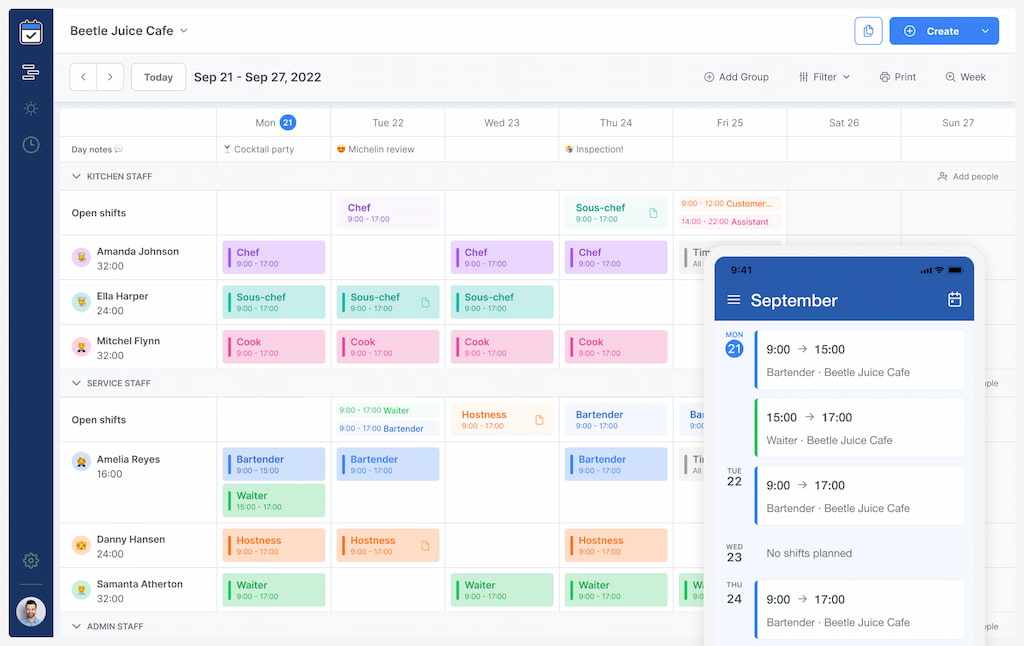
Employee availability management: Employees can input their availability, preferred shifts, and time-off requests directly into the system. This ensures accurate scheduling and reduces conflicts, enhancing employee satisfaction.
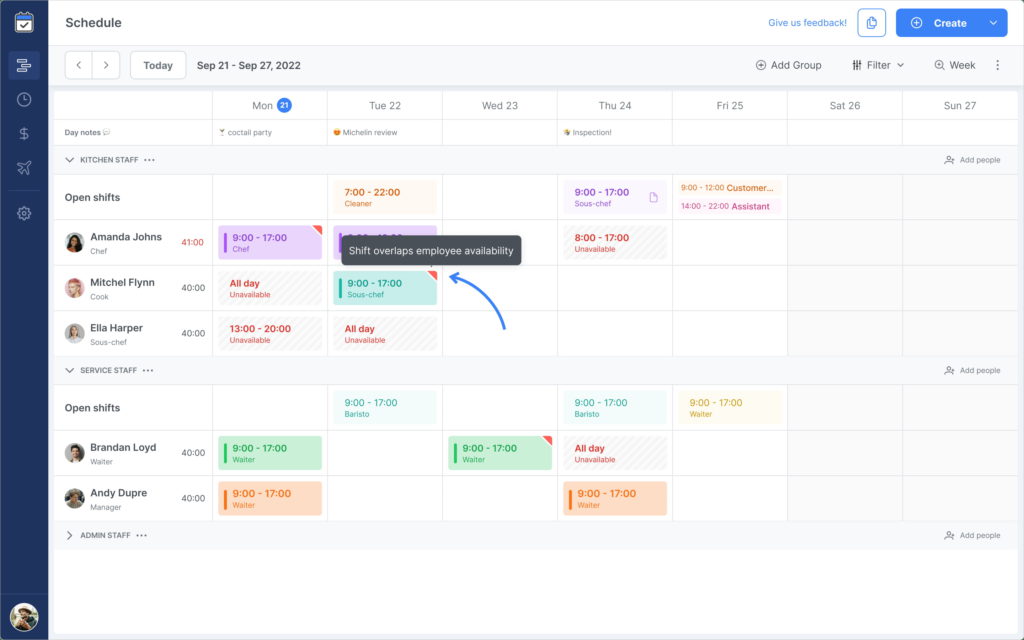
Attendance and payroll: Shifts by Everhour centralizes employee timesheets, making it easy for admins to view, edit, and manage hours for any employee or time period.
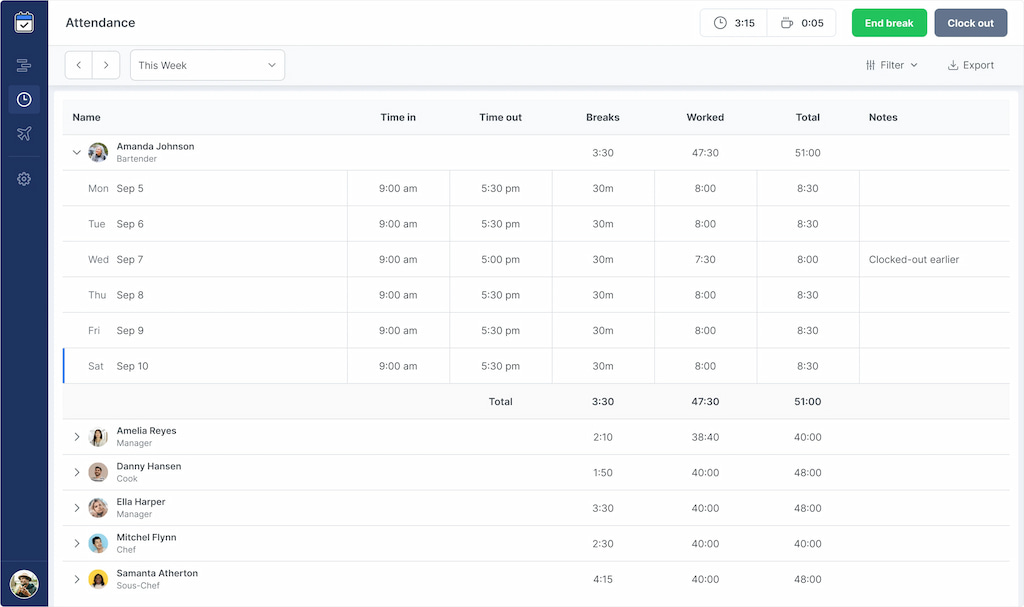
Real-time visibility: Managers have access to real-time visibility into staffing levels and coverage gaps, enabling informed decision-making when creating schedules. This helps optimize staffing levels and ensures adequate coverage during busy periods.
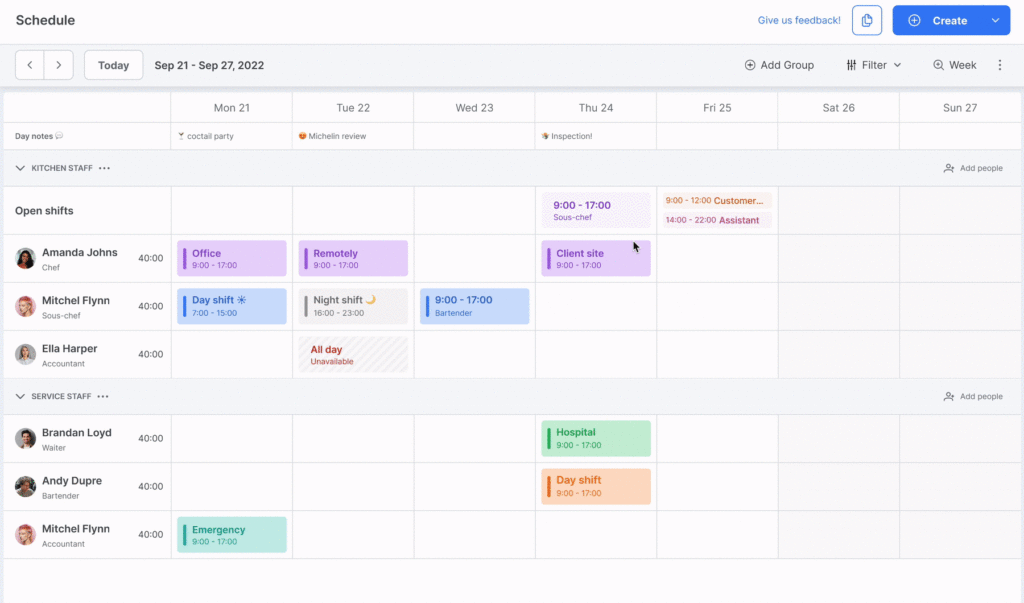
Communication tools: Shifts by Everhour offers built-in communication tools, including messaging and notifications. It keeps managers and staff informed of schedule changes and updates. This promotes collaboration and reduces confusion among team members.
Mobile clock-in/out: The platform allows employees to clock in and out using their mobile devices, providing flexibility for staff working remotely or in the field.
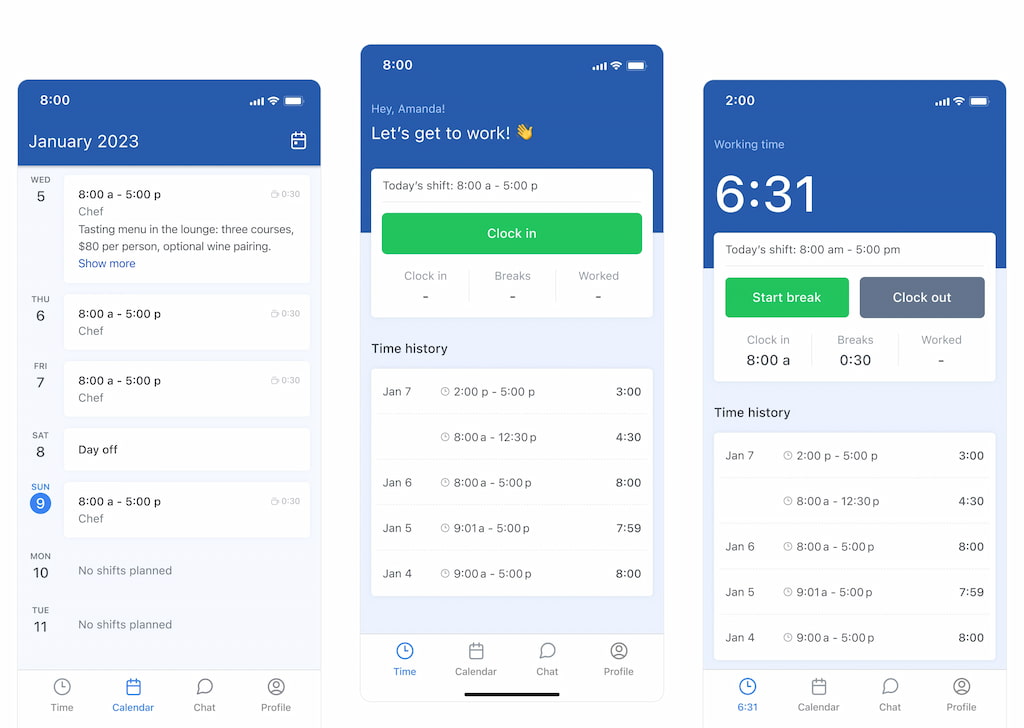
Overall, Shifts by Everhour simplifies staff scheduling processes and improves communication and collaboration among team members. By leveraging Shifts by Everhour, hospitality businesses can optimize scheduling, enhance employee satisfaction, and improve operational efficiency.
Ready to streamline your staff scheduling process? Try Shifts by Everhour today!
If you’re looking for a seamless way to improve shift planning, Shifts by Everhour is the perfect solution. As one of the best cleaning company scheduling software or any other industry, Shifts manages your workforce has never been simpler.
Conclusion
Effective staff scheduling is key to running a successful hospitality business. It helps balance staffing levels, boost efficiency, and keep guests satisfied. By tracking demand, considering employee preferences, and keeping schedules fair, businesses can meet both operational and staff needs.
Shifts by Everhour is a free work schedule maker that simplifies scheduling with tools for scheduling, managing availability, real-time updates, team communication, and mobile clock-ins. It simplifies the process and helps teams work better together, improving the overall guest experience.

